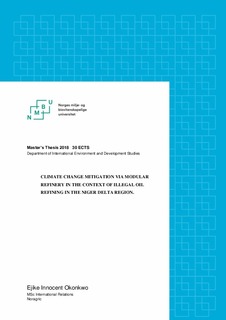| dc.description.abstract | This study examines the perception of the local community in the Niger Delta region on the socio-economic and environmental costs and benefits of climate change mitigation via modular refinery. According to IPCC (2014, p.6) “mitigation outcome may be influenced by how individuals perceive risks and uncertainties and take them into account.” The ancillary costs and benefits theory of climate change mitigation serves as a guide in the study. The theory shows that mitigation has ancillary effects (costs and benefits), and the parties involved are more likely to participate in mitigation if they perceive the benefits to outweigh the costs (Krupnick, Burtraw, & Markandya, 2000). Hence, the perception of the local community shapes their involvement in the mitigation process which is vital for achieving mitigation objectives. The literature review provides the contextual background; it establishes the link between oil production, environmental degradation, weak institution, loss of livelihood and the consequent emergence of illegal oil refinery as a survival alternative in the region. The latter constitutes one of the drivers of climate change in the region because they produce more criteria pollutants and are not subjected to environmental impact assessment (Iheriohanma 2016, p.30).
This study is based on qualitative research methods because it deals with subjective social realities. Data was generated using semi-structured interview to gain in-depth insight on respondents’ perception. The findings of this study show that most members of the local community are optimistic on the outcome of mitigation i.e. they perceive ancillary mitigation benefits to outweigh the costs. Therefore, the study concludes that future mitigation outcome has high chances of success in the region given the prevailing socio-economic circumstances. The study serves as a guide for policy makers and international environmental institutions on the likely future mitigation outcome in the region. It recommends among other things, the establishment of a mandatory Saving for Clean Future (SCF) contributory funds for staff of modular refineries, to ensure gradual transitioning to cleaner forms of energy. | nb_NO |

